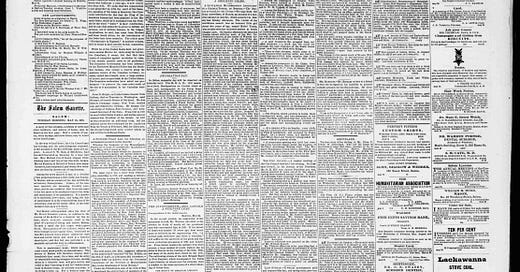In a recent post on the insanity trial episode of 1875, I wrote that “It is true almost no one saw Robert as heartless in 1875, though a few pretended to do so for political reasons.”
This post is about one of the few exceptions to that rule—an editorialist who went by the pen name “Eurus.”
“Eurus” was the Boston correspondent of the Salem [MA] Gazette, and he or she was one of the few who implied Robert was after his mother’s property, or at least had behaved with indefensible coldness towards her.
The Gazette’s editorial board saw fit to address Eurus’s remarks earlier on the page, adding in a note that after perusing the evidence as part of their “regular duty,” they found that Robert’s position was well-sustained. In other words, they were disavowing the position taken by “Eurus.”
Still, they noted, their Boston correspondent’s feelings only reflected “the view . . . which naturally presents itself to the mind of a person of strong and tender feeling. To such a mind the fact comes with a great shock.”1
What had Eurus said to call forth this aside?
He or she began by reminiscing about April 15, 1865, when people in Boston woke up to the horrifying news of Lincoln’s assassination:
‘Thoughtful women said with tears, ‘There is one that will suffer more than all others by this terrible event; men may talk of their country’s loss, or their party’s; the wife of Mr. Lincoln will be the great sufferer.’ Men answered, ‘our country will remember and retest his widow and family. While that flag floats, all that was dear to his domestic life shall be defended and cherished by his country and his loyal friends.’ In this city sympathy for Mrs. Lincoln prompted ladies of social influence to open a subscription, hoping to raise a hundred thousand dollars to be handed to her.”
“She was whelmed with outpourings of consolation from states and cities, clubs and societies,” Eurus continued, even getting a letter from Queen Victoria.
“Time rolls on, and the widow in her loneliness wanders into one eccentricity, apparently in apprehension of want, and how mercifully was she dealt with. She plans a visit to Europe, and the hope is uttered in loyal print that ‘this vulgar American woman’ (sic) the companion of our ‘martyred’ President, will not profane the royal presence of the widowed Victoria.’’
Eurus said that on return from Europe, Mary had handled herself well in Chicago, according to neighbors whom Eurus had consulted with and deemed deemed adequate to make such a call.
But then, “Suddenly we find [Mrs. Lincoln]” in an insane asylum, Eurus continued, and “her $75,000 U.S. bonds are removed for her person, and other bonds are applied to her person…her son appears to be the chief manager…the unlooked for reverse in her situation drove her to despair,” leading to Mary’s suicide attempt, “and this was an excuse for more closely confining her.”
Eurus insisted that Mary’s symptoms—based on the available evidence—were nothing more than “the womanly passion for purchasing dry goods with her own money, and taking too good care of her U.S. bonds.”2
The Salem Gazette, May 25, 1875.
Correspondence from “Eurus,” The Salem Gazette, May 25, 1875. This was reprinted in the Weekly Louisianian of New Orleans on June 19, 1875, credited to the correspondent of the Salem Gazette. Perhaps written or passed on by Rhoda White, who was and writer and had connections to New Orleans at this time?




